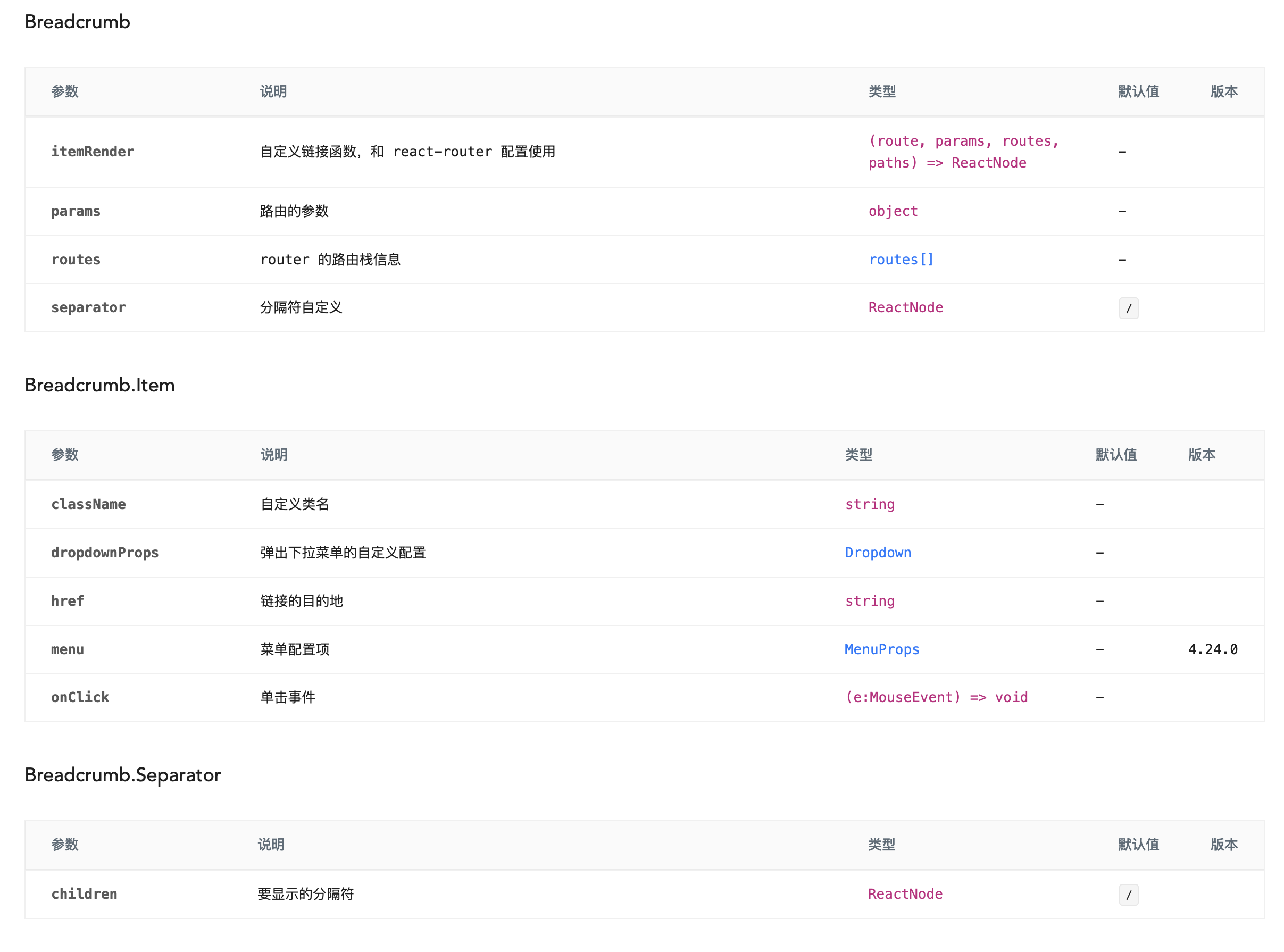on
类型定义转换组件props描述文档
维护组件库的过程总是充满惊喜的。
但有时候随着频繁的操作一些流程内的东西,会发现很多低效的事情。
今天想说一下的,就是在开发组件的同时,必不可少的一步 - 编写组件说明文档。
而编写文档中,特别特别特别繁琐的一件事就是 编写 props 说明表格。
什么是 props 说明表格?
这里就拿 ant-design 里面的 props 说明来看一下。

图片源于:https://ant.design/components/breadcrumb-cn
对,就是这个,每次在维护文档的时候都要写,是一件繁琐且需要细心的事情。
可以可以自动生成呢?
其实有遇到过一些可以自动生成 props 说明文档的框架,很好奇怎么实现的。
至少说明一件事情,答案一定可以的。
类型定义
首先,组件库得是 TypeScript 写的。
类型的定义没有什么可以展开说的,如果不是特别了解 TS 建议先学习一下再来这里~
interface BreadcrumbProps {
prefixCls?: string;
routes?: Route[];
params?: any;
separator?: React.ReactNode;
itemRender?: (
route: Route,
params: any,
routes: Array<Route>,
paths: Array<string>,
) => React.ReactNode;
style?: React.CSSProperties;
className?: string;
children?: React.ReactNode;
}
代码段来自:https://github.com/ant-design/ant-design/blob/master/components/breadcrumb/Breadcrumb.tsx
解析类型
自动生成文档的第一步,就是要解析组件的类型定义,能够识别出哪个是 prop 的名字,哪个是 prop 对应的类型。
这个涉及到语法解析。靠自己来造轮子有点太复杂了,如果时间允许可以研究,既然现在是想提效,那就借助一下3方库typedoc。
这个库可其实很强大,可以直接生成具体类型的描述网页,仅需运行即可。
但是因为组件库一般都有自己的官方网站,我们需要的只是解析出来的信息。这里我选择了 json 数据结构
入口
typedoc 需要一个入口配置,告诉它从哪里开始查找类型,解析类型。
默认是自动寻找tsconfig.json中的配置,但是 每个组件都有自己所属的文件夹,类型文件又都在每个具体的文件夹中,所以入口就变成多个了。
typedoc 如果在项目中 找到了 typedoc.json 这个文件,则会优先按照这个文件的配置来
// typedoc.json
{
"entryPoints": ["./src/index.ts", "./src/secondary-entry.ts"],
"out": "doc"
}
多入口给 entryPoints 传递一个数组即可。
wait wait 胃特 胃
难不成我得手动维护这个配置文件?有新的组件加一个入口?
拒绝!
自动生成typedoc.json
typedoc.json 这个配置文件,其实就 2 个配置,一个入口,一个出口。
入口是存在动态改变的可能性,那我们就去动态读目录,获取所有组件的文件夹,拼接好入口数组即可
这个需要的先决条件:
- 存放组件的若干文件夹在一个特定的目录下。 (栗子中是 lib/components)
- 每一个组件需要构建文档的类型在特定文件内定义。 (栗子中选择了 type.ts)
async function generateTypeJsonFile() {
const COMPONENT_DIR_PATH = `${ROOT_PATH}/lib/components`;
try {
const files = await fs.readdirSync(COMPONENT_DIR_PATH);
const tempEntryPoints = [];
// 构建typedoc需要的多入口
for (const file of files) {
const isExistTypeFile = await fs.existsSync(`${COMPONENT_DIR_PATH}/${file}/type.ts`);
if (isExistTypeFile) {
tempEntryPoints.push(`"lib/components/${file}/type.ts"`);
} else {
console.log(`[ ${file} ] 没有找到对应类型文件,请检查。\n`);
}
}
// 将构建好的配置内容写入文件
await fs.writeFileSync(
'./typedoc.json',
['{', ` "entryPoints": [${tempEntryPoints.join(', ')}],`, ' "out": "type-docs"', '}'].join('\n')
);
} catch (err) {
console.error(err);
return '读取组件文档失败!';
}
}
生成类型描述的 json 文件
这个在配置好配置文件之后很简单,只需要运行命令
$ npx typedoc --json [typedoc.json path]
这个也要自动化运行
shell.exec(`npx typedoc --json ${TYPE_JSON_DOC_PATH}`);
会得到一个类型描述的json文件,类似下面这样
{
"id": 8,
"name": "Separator",
"kind": 4194304,
"kindString": "Type alias",
"flags": {},
"sources": [
{
"fileName": "packages/sugar-design/lib/components/Breadcrumb/type.ts",
"line": 13,
"character": 12
}
],
"type": {
"type": "union",
"types": [
{
"type": "reference",
"typeArguments": [
{
"type": "query",
"queryType": {
"type": "reference",
"name": "BUILT_IN_SEPARATOR"
}
}
],
"name": "ValueOf",
"qualifiedName": "ValueOf",
"package": "type-fest"
},
{
"type": "reference",
"name": "React.ReactNode",
"qualifiedName": "React.ReactNode",
"package": "@types/react"
}
]
}
}
读取描述 json 文件
读取 json 文件是整个环节里最重要,也是主要的开发量。
读取,其实就是解析,TS的所有类型写法都会以一种不同的type来展示
const TYPE_MAP = {
// 基础类型
INTRINSIC: 'intrinsic',
// 定义一个对象的具体类型(暂时这么认为)
REFLECTION: 'reflection',
// 引用别的类型
REFERENCE: 'reference',
// 联合类型
UNION: 'union',
// 交叉类型
INTERSECTION: 'intersection',
// 数组
ARRAY: 'array',
// 条件类型
CONDITIONAL: 'conditional',
};
通过递归去解析拼凑字符串
function propTypeIdentify(argumentType) {
if (argumentType.type === ARGUMENT_TYPE.INTRINSIC) {
/**
* 基础类型
*/
return argumentType.name;
} else if (argumentType.type === ARGUMENT_TYPE.LITERAL) {
/**
* 字面量类型
* type A = 'a' / interface Test { a: true; b: '11'; c: 12 } 等
*/
return argumentType.value;
} else if (argumentType.type === ARGUMENT_TYPE.REFERENCE) {
/**
* 类型引用
*/
return argumentType.name;
} else if (argumentType.type === ARGUMENT_TYPE.UNION) {
/**
* 联合类型
*/
return argumentType?.types?.map((type) => propTypeIdentify(type));
} else if (argumentType.type === ARGUMENT_TYPE.QUERY) {
/**
* TODO: 暂时理解成ValueOf类似的第三方包提供的范型
*/
return `${argumentType.name}\\<typeof ${argumentType?.queryType?.name}\\>`;
} else if (argumentType.type === ARGUMENT_TYPE.REFLECTION && argumentType?.declaration?.children) {
/**
* 对象类型
*/
const objectType = argumentType?.declaration?.children?.map(
// 这里因为数据结构与props的reflection类型数据结构相同,直接复用
(typeItem) => `${typeItem.name}: ${propTypeIdentify(typeItem)}`
);
return `{ ${objectType.join(', ')} }`;
} else if (argumentType.type === ARGUMENT_TYPE.REFLECTION && argumentType?.declaration?.signatures) {
/**
* 函数类型
*/
const params = argumentType?.declaration?.signatures?.[0]?.parameters?.map(
(param) => `${param.name}: ${propTypeIdentify(param)}`
);
const returnType = argumentType?.declaration?.signatures?.[0]?.type?.name;
return `\\(${params ? params?.join(', ') : ''}\\) => ${returnType}`;
} else if (argumentType.type === ARGUMENT_TYPE.ARRAY) {
/**
* 数组类型
*/
return `${simpleTypeObjectIdentify(argumentType?.elementType)}\\[\\]`;
} else {
return 'TestArgument';
}
}
拼凑
然后,我们解析出的每一个类型都会被拼接成字符串
// 类型文档拼接
function typeDocConcat(componentTypeJson) {
let typeDocTemplate = [];
const templateHeader = ['| 参数 | 说明 | 类型 | 必填 | 默认值 |', '| ----- | ------ | ------ | ---- | ------ |'];
for (const componentType of componentTypeJson?.children || []) {
if (canBuildDoc(componentType)) {
typeDocTemplate.push(`\n### ${componentType.name}\n`);
// interface类型
if (componentType.kindString === TYPE_DEFINITION_WAY.INTERFACE) {
const resultString = reflectionTypeStringConcat(componentType.children || []);
typeDocTemplate.push(...templateHeader, ...resultString);
} else if (
componentType.kindString === TYPE_DEFINITION_WAY.TYPE &&
componentType?.type?.type === TYPE_MAP.REFERENCE
) {
// type 方式定义的类型引用场景 (type A = B)
typeDocTemplate.push(`\n请参考${componentType?.type?.name}`);
} else if (
componentType.kindString === TYPE_DEFINITION_WAY.TYPE &&
componentType?.type?.type === TYPE_MAP.REFLECTION
) {
/**
* type 方式定义的对象类型
* type A = { a: string; b: number };
*/
const resultString = reflectionTypeStringConcat(componentType?.type?.declaration?.children || []);
typeDocTemplate.push(...templateHeader, ...resultString);
} else if (
componentType.kindString === TYPE_DEFINITION_WAY.TYPE &&
componentType?.type?.type === TYPE_MAP.INTERSECTION
) {
/**
* type 方式定义的交叉类型
* type A = B & C;
*/
typeDocTemplate.push(...templateHeader);
componentType?.type?.types.forEach((aliasItem) => {
if (aliasItem.type === TYPE_MAP.REFLECTION) {
const resultString = reflectionTypeStringConcat(aliasItem?.declaration?.children || []);
typeDocTemplate.push(...resultString);
} else if (aliasItem.type === TYPE_MAP.REFERENCE) {
typeDocTemplate.push(
`|${aliasItem.name}| 请参考 ${aliasItem.name} 组成交叉类型 | ${aliasItem.name} | - | - |`
);
}
});
} else if (
componentType.kindString === TYPE_DEFINITION_WAY.TYPE &&
componentType?.type?.type === TYPE_MAP.UNION
) {
/**
* type 方式定义的联合类型
* type A = B | C;
*/
componentType?.type?.types.forEach((aliasItem) => {
typeDocTemplate.push(...templateHeader);
if (aliasItem.type === TYPE_MAP.REFLECTION) {
const resultString = reflectionTypeStringConcat(aliasItem?.declaration?.children || []);
typeDocTemplate.push(...resultString);
} else if (aliasItem.type === TYPE_MAP.REFERENCE) {
typeDocTemplate.push(
`|${aliasItem.name}| 请参考 ${aliasItem.name} 组成联合类型 | ${aliasItem.name} | - | - |`
);
}
});
}
}
}
}
结果
拼凑的字符串会被写入特定文件
### BreadcrumbProps
| 参数 | 说明 | 类型 | 必填 | 默认值 |
| ----- | ------ | ------ | ---- | ------ |
|activeId|activeId|T|否|-|
|className|className|string|否|-|
|clickLastOption|当前节点是否可以点击(仅影响末尾节点,对手动active节点无效)|boolean|否|-|
|onChange|onChange|\(id: T, event: MouseEvent\<HTMLElement, MouseEvent\>\) => void|否|-|
|options|options|BreadcrumbItem\[\]|否|-|
|separator|自定义分隔符|Separator|否|-|
|size|size|BreadcrumbSize|否|-|
|style|style|CSSProperties|否|-|
|withEllipsis|withEllipsis|boolean|否|-|
### DefaultBreadcrumbProps
| 参数 | 说明 | 类型 | 必填 | 默认值 |
| ----- | ------ | ------ | ---- | ------ |
|separator|separator|Separator|是|-|
|size|size|BreadcrumbSize|是|-|
这样就大功告成了。